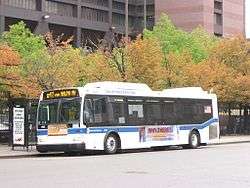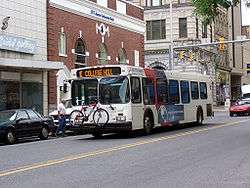George Washington Bridge Bus Station
Coordinates: 40°50′56″N 73°56′18″W / 40.84889°N 73.93833°W
George Washington Bridge Bus Station | |
|---|---|
 view of the station from the northwest (2013) | |
| Location |
between Ft. Washington & Wadsworth Aves, and W. 178th & W. 179th Sts. Manhattan, New York City United States |
| Owned by | Port Authority of New York and New Jersey |
| Operated by | Port Authority of New York and New Jersey |
| Platforms | Upper Level Gates A through E. |
| Connections |
New York City Subway: 175th Street ( 181st Street ( |
| Construction | |
| Architect | Pier Luigi Nervi |
| Other information | |
| Website | GWBBS |
| History | |
| Opened | January 17, 1963 |
| Closed | Aug 2014 renovations. |
| Traffic | |
| Passengers (2015) | 6.9 million |
George Washington Bridge Bus Station is a commuter bus terminal located at the east end of the George Washington Bridge in the Washington Heights area of Manhattan in New York City, New York. The bus station is owned and operated by the Port Authority of New York and New Jersey. On a typical weekday, approximately 20,000 passengers on about 1000 buses use the station.[1]
The building, an example of 1960s urban renewal, has been described as a blight on its surrounding environment[2] and "a brutal assault on the senses".[3] Its upper-level bus ramps block light, as well as the view of the George Washington Bridge, from an entire block of Fort Washington Avenue;
Major renovations, including an expansion of retail space from 30,000 to 120,000 square feet (2,800 to 11,100 m2), have been in progress with an expected cost of more than US$183 million.[4] The work started in late 2013 and is expected to be completed in the early winter of 2016.[5][6]
Architecture
The station is built over the Trans-Manhattan Expressway (Interstate 95) between 178th and 179th Streets and Fort Washington and Wadsworth Avenues, and features direct bus ramps on and off the upper level of the bridge.
The building was designed by noted Italian engineer Pier Luigi Nervi and is one of only a few buildings he designed outside of Italy.[7] It opened January 13, 1963 as a replacement for a series of sidewalk bus loading areas that existed between 166th and 167th streets further south.[8] The building is constructed of huge steel-reinforced concrete trusses, fourteen of which are cantilevered from supports in the median of the Trans-Manhattan Expressway, which it straddles. The building contains murals as well as busts of George Washington and Othmar Amman, the civil engineer who designed the bridge. The building received the 1963 Concrete Industry Board’s Award.[9]
The building's roof trusses have been described as resembling butterfiles,<ref "huxtable">Huxtable, Ada Louise (June 15, 2004). "A Landmark Destination: The Bus Station". The Wall Street Journal. Retrieved August 25, 2016.</ref> though this butterfly-like doubled-triangle view can be seen only if the trusses are viewed or photographed from above, an angle only available to aircraft passengers or to maintenance workers atop the New York tower of the nearby George Washington Bridge.
The first floor of the bus terminal will have additional space for stores. (all undergoing major renovations.) and a passenger waiting area.
Renovation
A renovation project is currently underway in the terminal. The project is expected to cost US$183 million. The project is a partnership between the Port Authority and a private company known as GWBBS Development Venture, LLC.[10] Tutor Perini received a $100 million construction contract in August 2013. Construction, which was repeatedly delayed, began at the end of 2013; the project is expected to be completed in the late spring of 2017.[5][6][11]
The renovated building will be improved with better access to local subway stops, displays of bus departure and arrival times, and central air conditioning. It will increase retail space from 30,000 to 120,000 square feet (2,800 to 11,100 m2) with large tenants like Marshalls, Key Food, and Blink Fitness.[4] It will be fully ADA compliant for accessibility to those with disabilities.[12][13][14]
Accessibility
Some portions of the terminal are wheelchair accessible, but many of the bus platforms are not. In addition, the New York City Bus' M4 route provides wheelchair accessible service to Fort Tryon Park bus accessing the bus stop one block south of the station, continuing inside the park to the Cloisters Museum when open.
New York City Subway
The complex is served by the 175th Street station of the New York City Subway, located on Fort Washington Avenue, with entrances at 175th Street and 177th Street, the latter one block south of the bus station. The subway station, operated by the New York City Transit Authority and served by the A train, was part of the Independent Subway System (IND)'s first line, the IND Eighth Avenue Line, which opened in 1932.
The bus station is also within walking distance of the 181st Street station of the same line, and the 181st Street IRT Broadway – Seventh Avenue Line station on the 1 train.
Bus service

As of 2016, the bus lines detailed below serve the terminal for the New York City Transit Authority, New Jersey Transit, Coach USA (Rockland Coaches and Short Line) and Ameribus.[15] Service is also provided by Spanish Transportation with its Express Service jitneys.[16]
MTA Regional Bus Operations
Local buses stop at a lower level and on the streets outside the station. Local service includes:
- M4 on the Ft. Washington Av side, M5, M100 and Bx7 (outside the station on Broadway)
- M98, Bx3, Bx11, Bx13, Bx35 and Bx36 (on 178th & 179th streets between Ft Washington Av and Broadway). The Bx13 serves Yankee Stadium.
New Jersey Transit

| Route | Terminal | via | notes |
|---|---|---|---|
171 |
Paterson Broadway Bus Terminal | GWB Plaza Route 4 |
|
175 |
Ridgewood Bus Terminal | GWB Plaza New Jersey Route 4 Hackensack, Paramus, Rochelle Park |
some trips do not stop at Garden State Plaza or Bergen Community College |
178 |
Hackensack Bus Terminal | GWB Plaza, New Jersey Route 4 Grand Avenue, Teaneck Armory, Englewood Avenue |
express variation of 182 limited Sunday service |
181 |
Bergenline Ave. Station | GWB Plaza, Palisade Avenue, Bergenline Avenue | Limited Service |
182 |
Hackensack Bus Terminal | GWB Plaza, Fort Lee Road, DeGraw Avenue | local variation of 178 |
186 |
Dumont | GWB Plaza, Sylvan Avenue, Palisades Avenue, Teaneck Road | |
188 |
West New York | GWB Plaza, via River Road Edgewater 60 Street at Kennedy Boulevard |
Limited Service |
Coach USA
Rockland Coaches
| Route | Terminals | via |
|---|---|---|
| 9A & 9AT | New City (9A and 9W) (full-time) Central Nyack (9W) or Stony Point (9) (peak service only) |
Sylvan Avenue, Oak Tree Road, Piermont Avenue/River Road, Broadway, Nyack Turnpike (Central Nyack trips only) Lake Road, Main Street, Route 9W (Stony Point is served on select rush-hour trips) |
Short Line
| Route | Service | Terminals | Serving | Notes |
|---|---|---|---|---|
| 208 |
PM peak | Montgomery, NY Route 211 and Clinton Street |
Washingtonville, Monroe, Central Valley, Ridgewood, NJ |
|
| AM peak | East Side, Manhattan 23rd Street and 2nd Avenue |
Manhattan neighborhoods: Washington Heights, Harlem, East Harlem, Yorkville, Upper East Side, Turtle Bay, Murray Hill, Kips Bay. |
| |
Ameribus
| Route | Service | Terminals | via |
|---|---|---|---|
| 11C |
|
Spring Valley | Fort Lee, Englewood, Bergenfield, New Milford, Oradell, Emerson, Westwood, Hillsdale, Woodcliff Lake, Park Ridge, Montvale, Pearl River, Nanuet |
| 20/84 |
|
Tappan, NY | Englewood, Tenafly, Cresskill, Demarest, Closter, Harrington Park, Norwood, Northvale, Rockleigh |
See also
- Port Authority Bus Terminal
- Journal Square Transportation Center
- George Washington Bridge Plaza, across the bridge in Fort Lee, New Jersey
References
Notes
- ↑ Vanterpool, Veronica (July 6, 2011). "New Life For GW Bridge Bus Station Overhaul". Tri-State Transportation Campaign. Retrieved July 15, 2011.
- ↑ Rizzo, Chris. "Port Authority Renovation Will Begin...Soon". Hudson Heights Gazette. Retrieved August 24, 2016.
- ↑ Rivlin-Nadler, Max. "Port Authority Closes Dilapidated GWB Bus Terminal For Long-Overdue Renovation". Gothamist. Retrieved August 25, 2016.
- 1 2 "Port Authority Prepares for Major Overhaul of George Washington Bridge Bus Station" (Press release). Port Authority of New York and New Jersey. June 30, 2011. Retrieved July 15, 2011.
- 1 2 Pires, Claire (October 28, 2013). "George Washington Bridge Bus Station Is Finally Being Renovated". Northattan. Retrieved December 30, 2013.
- 1 2 Hughes, C. L. (October 15, 2014). "Affordable Manhattan in Hudson Heights". The New York Times.
- ↑ Bernstein, Fred A. (November 2, 2004). "Second Look: George Washington Bridge Bus Station / Pier Luigi Nervi, 1963". ArchNewsNow. Retrieved June 11, 2014.
- ↑ "George Washington Bridge Bus Station History". Port Authority of New York and New Jersey. Retrieved June 11, 2014.
- ↑ Renner, James (September 1998). "George Washington Bridge Bus Station". Washington Heights & Inwood Online. Retrieved March 27, 2010.
- ↑ Strunsky, Steve (January 17, 2013). "GW Bridge Bus Station gets $183 million facelift for 50th birthday". The Star-Ledger. Retrieved June 11, 2014.
- ↑ Strunsky, Steve (August 24, 2014). "Overhaul of GWB bus station begins Monday". The Star-Ledger. Retrieved August 25, 2014.
- ↑ "Port Authority's George Washington Bridge Bus Station Celebrates 50 Years of Regional Commuter Bus Service" (Press release). Port Authority of New York and New Jersey. January 13, 2013. Retrieved June 3, 2013.
- ↑ "Tutor Perini Building Corp. Awarded $100 Million Contract for George Washington Bridge Bus Station Redevelopment" (Press release). Tutor Perini. August 8, 2013. Retrieved August 25, 2013.
- ↑ Katz, Rayna (August 13, 2013). "Builder Chosen for GWB Bus Station Update". GlobeSt.com. Retrieved August 25, 2013.
- ↑ "Bus Carriers and Routes". Port Authority of New York and New Jersey. Retrieved June 1, 2015.
- ↑ "Express Service - Bus Terminals (Where Do You Want to Go)". Spanish Transportation. Archived from the original on October 6, 2012. Retrieved May 14, 2013.
- ↑ Perez, Chris (May 8, 2014). "New Life For GW Bridge Bus Station Overhaul". Retrieved July 31, 2015.
- ↑ "AmeriBus Commuter Service to the GWB Bus Terminal from Bergen and Rockland County". Retrieved July 31, 2015.
External links
| Wikimedia Commons has media related to George Washington Bridge Bus Station. |
.jpg)




.jpg)
